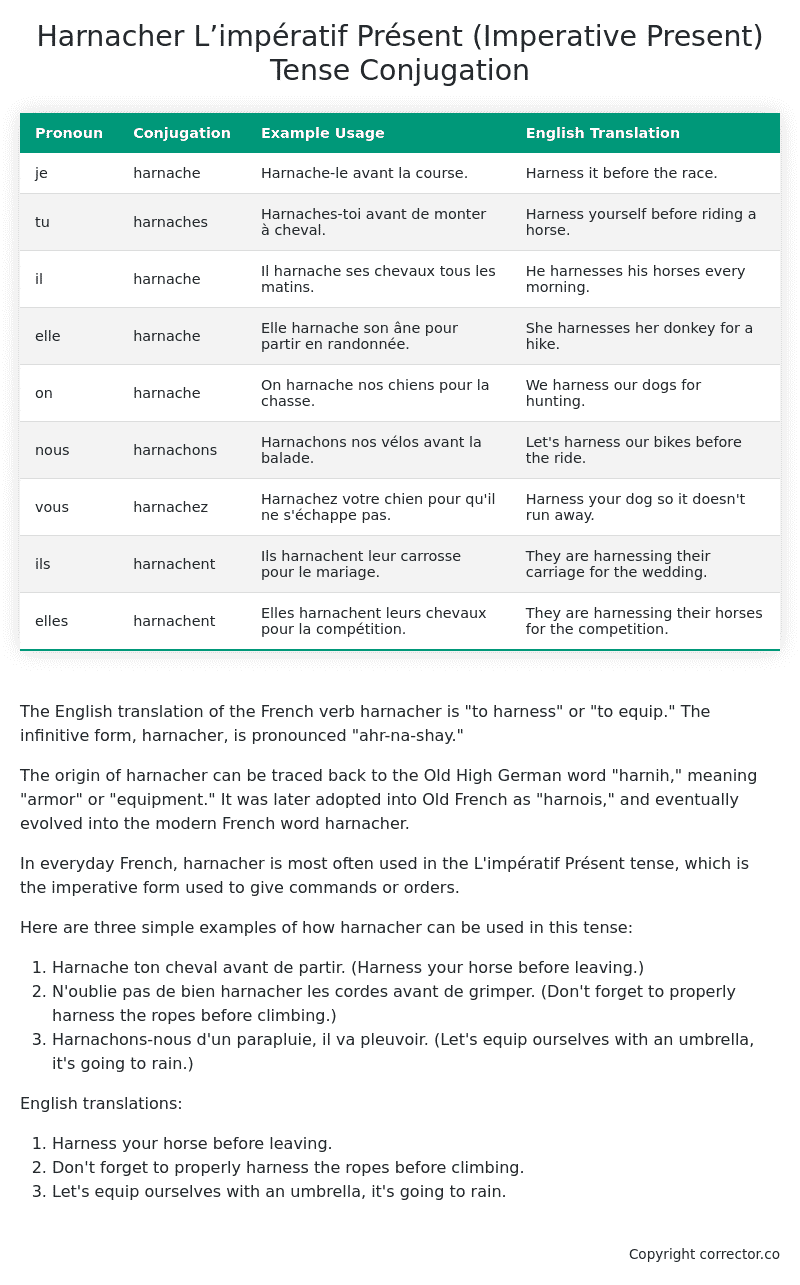L’impératif Présent (Imperative Present) Tense Conjugation of the French Verb harnacher
Introduction to the verb harnacher
The English translation of the French verb harnacher is “to harness” or “to equip.” The infinitive form, harnacher, is pronounced “ahr-na-shay.”
The origin of harnacher can be traced back to the Old High German word “harnih,” meaning “armor” or “equipment.” It was later adopted into Old French as “harnois,” and eventually evolved into the modern French word harnacher.
In everyday French, harnacher is most often used in the L’impératif Présent tense, which is the imperative form used to give commands or orders.
Here are three simple examples of how harnacher can be used in this tense:
- Harnache ton cheval avant de partir. (Harness your horse before leaving.)
- N’oublie pas de bien harnacher les cordes avant de grimper. (Don’t forget to properly harness the ropes before climbing.)
- Harnachons-nous d’un parapluie, il va pleuvoir. (Let’s equip ourselves with an umbrella, it’s going to rain.)
English translations:
- Harness your horse before leaving.
- Don’t forget to properly harness the ropes before climbing.
- Let’s equip ourselves with an umbrella, it’s going to rain.
Table of the L’impératif Présent (Imperative Present) Tense Conjugation of harnacher
| Pronoun | Conjugation | Example Usage | English Translation |
|---|---|---|---|
| je | harnache | Harnache-le avant la course. | Harness it before the race. |
| tu | harnaches | Harnaches-toi avant de monter à cheval. | Harness yourself before riding a horse. |
| il | harnache | Il harnache ses chevaux tous les matins. | He harnesses his horses every morning. |
| elle | harnache | Elle harnache son âne pour partir en randonnée. | She harnesses her donkey for a hike. |
| on | harnache | On harnache nos chiens pour la chasse. | We harness our dogs for hunting. |
| nous | harnachons | Harnachons nos vélos avant la balade. | Let’s harness our bikes before the ride. |
| vous | harnachez | Harnachez votre chien pour qu’il ne s’échappe pas. | Harness your dog so it doesn’t run away. |
| ils | harnachent | Ils harnachent leur carrosse pour le mariage. | They are harnessing their carriage for the wedding. |
| elles | harnachent | Elles harnachent leurs chevaux pour la compétition. | They are harnessing their horses for the competition. |
Other Conjugations for Harnacher.
Le Present (Present Tense) Conjugation of the French Verb harnacher
Imparfait (Imperfect) Tense Conjugation of the French Verb harnacher
Passé Simple (Simple Past) Tense Conjugation of the French Verb harnacher
Passé Composé (Present Perfect) Tense Conjugation of the French Verb harnacher
Futur Simple (Simple Future) Tense Conjugation of the French Verb harnacher
Futur Proche (Near Future) Tense Conjugation of the French Verb harnacher
Plus-que-parfait (Pluperfect) Tense Conjugation of the French Verb harnacher
Passé Antérieur (Past Anterior) Tense Conjugation of the French Verb harnacher
Futur Antérieur (Future Anterior) Tense Conjugation of the French Verb harnacher
Subjonctif Présent (Subjunctive Present) Tense Conjugation of the French Verb harnacher
Subjonctif Passé (Subjunctive Past) Tense Conjugation of the French Verb harnacher
Subjonctif Imparfait (Subjunctive Imperfect) Tense Conjugation of the French Verb harnacher
Subjonctif Plus-que-parfait (Subjunctive Pluperfect) Tense Conjugation of the French Verb harnacher
Conditionnel Présent (Conditional Present) Tense Conjugation of the French Verb harnacher
Conditionnel Passé (Conditional Past) Tense Conjugation of the French Verb harnacher
L’impératif Présent (Imperative Present) Tense Conjugation of the French Verb harnacher (this article)
L’infinitif Présent (Infinitive Present) Tense Conjugation of the French Verb harnacher
Struggling with French verbs or the language in general? Why not use our free French Grammar Checker – no registration required!
Get a FREE Download Study Sheet of this Conjugation 🔥
Simply right click the image below, click “save image” and get your free reference for the harnacher L’impératif Présent tense conjugation!

Harnacher – About the French L’impératif Présent (Imperative Present) Tense
Usage
Giving commands
Making requests
Offering advice
Expressing desires
Conjugation Formation
Interactions with other tenses
Want More?
I hope you enjoyed this article on the verb harnacher. Still in a learning mood? Check out another TOTALLY random French verb conjugation!


